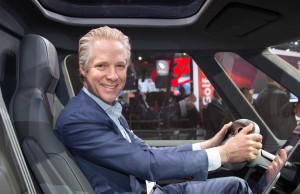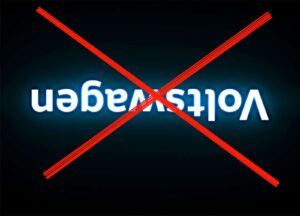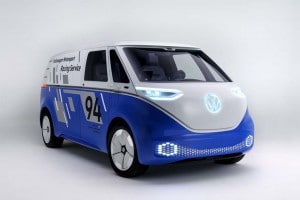
Volkswagen of America’s chief executive took responsibility and apologized for the pre-April Fools’ Day prank this week in which the company claimed it was changing its U.S. name to “Voltswagen.”
The move, it claimed on Monday and again the next day, was meant to help focus on the brand’s ongoing shift from internal combustion engines to battery-electric propulsion. It said it would be backed by a major marketing campaign to promote VW’s first long-range BEV for the U.S. market, the ID.4.
Word first “leaked out” in what was billed by VW sources as an inadvertent posting on the company website on March 29. It was followed a day later by a formal statement and backed up by company PR representatives who assured members of the media that it was a real plan, not a stunt.
The gag unravels

Stories quickly appeared in a number of major news and automotive outlets, including TheDetroitBureau.com. Some raised questions about what VW was actually up to. This site postulated that the name change might be part of a promotional effort, much as restaurant IHOP did in 2019 when it briefly renamed itself IHOB to show it served more than pancakes.
The gag unraveled on April Fools’ Day when sources at the company revealed it really was a prank, the automaker that evening acknowledging There will be no renaming of Volkswagen of America,” and adding that “The alleged renaming was designed to be an announcement in the spirit of April Fool’s Day, highlighting the launch of the all-electric ID.4 SUV and signaling our commitment to bringing electric mobility to all.”
Not many folks were amused, particularly in the news media, many journalists noting that sources at VW not only participated in the prank but openly lied when speaking on background.
A belated apology … more or less
“We didn’t mean to mislead anyone,” one of those sources has since said, others at the company pointing to the fact that it is far from uncommon for automakers to issue April Fools’ Day news releases. The reality is that this stunt not only began days earlier but was also backed up by outright lying.

“Never in our wildest dreams did we imagine it taking hold,” Scott Keogh, CEO of Volkswagen Group of America, said in a Thursday interview with The Wall Street Journal. “If there’s any trust or credibility to be rebuilt from me, I’m going to do it.”
A good prank features enough truth to seem credible. And the parent Volkswagen Group is clearly committed to EVs. It plans to spend more than $80 billion to develop models like the ID.4 and upcoming ID.Buzz microbus. CEO Herbert Diess is determined to top Tesla and needs to build public awareness.
VW CEO sees an upside. Others don’t
“It was a gag with humor, whether you like it or not,” Keogh added. “The upside is, obviously, the social response has been the biggest numbers we’ve ever seen.”
Anthony Johndrow, a specialist with Reputation Economy Advisors, is far less certain there was a positive payoff. The problem is that VW is still struggling to rebuild its reputation after the damage it suffered from its diesel emissions scandal. Now, it has been shown willing to play fast and loose with the facts, again.
“When bad ethical decision making is exposed … not seeming to scare about the facts can do long-term damage,” he said.

Meanwhile, “They’ve definitely tarnished their rep with journalists and that will hurt them long-term,” said Johndrow, adding that reporters “definitely are not going to take them at face value next time you hear from them.”
Shades of “dieselgate”
The prank could backfire in other ways, said Johndrow and others. It could make it more difficult for VW to win back trust from the regulators who levied record fines against the company for its diesel emissions lies. All told, VW has laid out about $34 billion in fines and other costs.
And then there are investors. Calling the strategy behind the prank “a slippery slope,” Daniel Ives, an analyst for investment firm Wedbush Securities said it created “buzz, but when it comes to a public company like this, it is a balancing act between buzz and also frustrating investors that actually believe it.”
The idea of renaming the company to focus on its EV push seemed to play well with shareholders who drove VW stock up from a low of $32.40 at the beginning of the week to a $38.46 high before the Voltswagen stung came unplugged. The automaker’s shares dropped bac to a $35.58 close on Thursday.








Voltswagon would of been an excellent moniker for their Electric Car Division